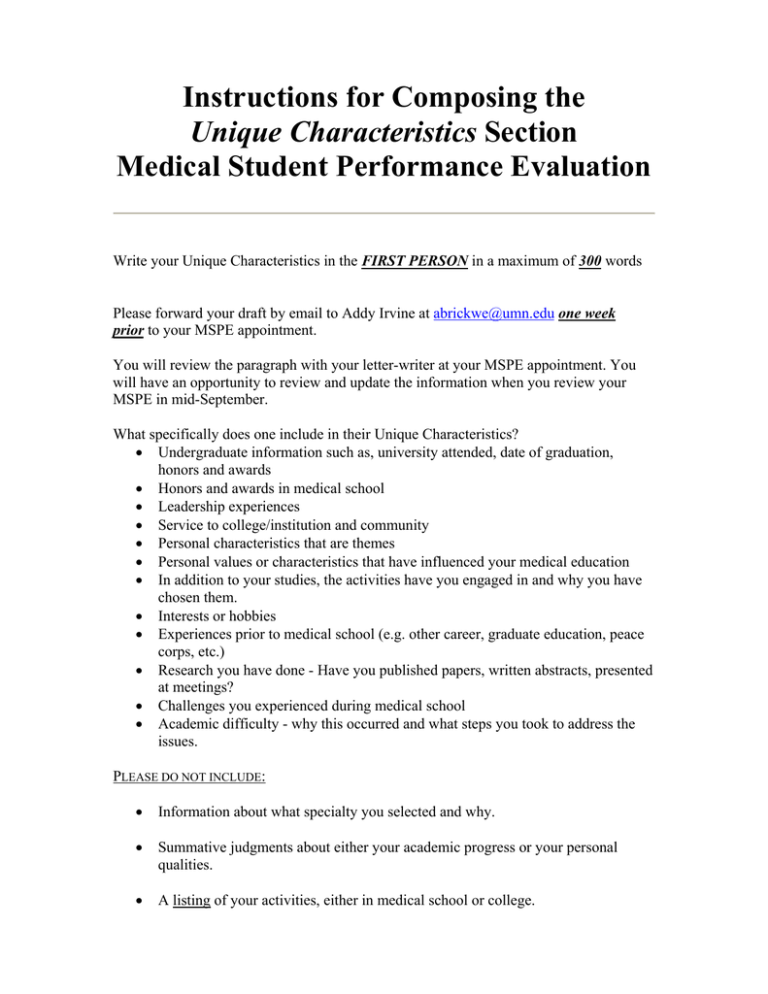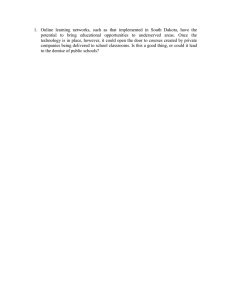Instructions for Composing the Medical Student Performance Evaluation Unique Characteristics
advertisement

Instructions for Composing the Unique Characteristics Section Medical Student Performance Evaluation Write your Unique Characteristics in the FIRST PERSON in a maximum of 300 words Please forward your draft by email to Addy Irvine at abrickwe@umn.edu one week prior to your MSPE appointment. You will review the paragraph with your letter-writer at your MSPE appointment. You will have an opportunity to review and update the information when you review your MSPE in mid-September. What specifically does one include in their Unique Characteristics? Undergraduate information such as, university attended, date of graduation, honors and awards Honors and awards in medical school Leadership experiences Service to college/institution and community Personal characteristics that are themes Personal values or characteristics that have influenced your medical education In addition to your studies, the activities have you engaged in and why you have chosen them. Interests or hobbies Experiences prior to medical school (e.g. other career, graduate education, peace corps, etc.) Research you have done - Have you published papers, written abstracts, presented at meetings? Challenges you experienced during medical school Academic difficulty - why this occurred and what steps you took to address the issues. PLEASE DO NOT INCLUDE: Information about what specialty you selected and why. Summative judgments about either your academic progress or your personal qualities. A listing of your activities, either in medical school or college. THE FOLLOWING PAGES CONTAIN INSTRUCTIONS AND EXAMPLES FOR YOUR REFERENCE IN A MAXIMUM OF 300 WORDS, PLEASE WRITE A PARAGRAPH THAT TOUCHES UPON SOME OR ALL OF THE FOLLOWING TOPICS: What personal values or characteristics have influenced your medical education? Example: “…life has been guided by my international experiences, working with the underserved and challenging my boundaries.” In addition to your studies, characterize the activities have you engaged in and explain why you have chosen them. Example: “…have sought to balance the varied facets of my personality while achieving academic excellence. My commitment to science is augmented by a love for the arts; this has allowed me to craft a successful beginning to my medical career.” “… possess a passion for music. As an undergraduate, I was a guitarist and songwriter for a successful acoustic rock band. I have continued this interest throughout medical school; composing and performing music gives me a creative outlet and has provided an important source of balance throughout my training.” Are there other interests or hobbies you wish to mention? Example: “…have an adventurous spirit, and I pursue a wide variety of interests. I learned to fly Cessna airplanes in high school and have competed in swim meets, I ride horses, snowboard, volunteer at medical facilities, and have regularly traveled overseas where I have assisted medical teams at two hospitals.” After college and prior to medical school did you have experiences you wish to mention (e.g. other career, graduate education, peace corps, etc.) Example: “…am a dedicated student who has engaged in diverse experiences. After graduating from college, I worked as the Education Coordinator for two environmental non-profit organizations in the Monterey Bay Area. I then moved with my husband to San Antonio, where I conducted research in Addiction Medicine with Dr. Richard Lamb while earning a B.S. in Nursing from the University of Texas Health Sciences Center. During this period, I also worked in the NICU and the MICU at University Hospital as well as volunteered as a planning committee member and head counselor for Camp Discovery, a camp for children with cancer.” Describe the research have you done? Have you published papers, written abstracts, presented at meetings? Example: “After graduating from… I accepted a position in a research laboratory at Oregon Health and Sciences University where I worked in the field of cancer genetics. I was employed for two years in this research laboratory, where I learned basic science techniques and formed hypotheses focusing on DNA mismatch repair.” Do you wish to mention any challenges you experienced during medical school? Example: “While in medical school, I overcame a significant personal hardship. In my second year of medical school, my mother died of breast cancer after a five year battle. I spent countless hours at doctor appointments and chemotherapy treatments with her mother. I have experienced first hand the triumph, the frustration, and the uncertainty of medicine.” If you experienced academic difficulty please explain why this occurred and what steps you took to address the issues. Example: "I have persevered through many setbacks in order to become a physician. I weathered the disappointment of narrowly missing passing the step 1 exam on his first attempt. While my father in-law battled terminal melanoma, I helped with hospice care and supported his family. At the same time, as I carried out these responsibilities, I successfully prepared for the reexamination and improved my score substantially. I have emerged from these experiences with a renewed sense of direction and a deep compassion for patients and families that suffer together through the adversity of disease." PLEASE DO NOT INCLUDE: Information about what specialty you selected and why. Summative judgments about either your academic progress or your personal qualities. A listing of your activities, either in medical school or college. Example 1 I seek to combine my academic pursuits with humanitarian activities. I have aimed to improve my educational experience by immersing myself in activities inside and outside the classroom with the intent to connect to future patients and to gain their trust. I volunteered at a community center called Youthlink, which provides free healthcare to homeless, inner-city youth of Minneapolis, and support my peers through the Confidential Peer Assistance Program. I have demonstrated leadership in medical activism, multicultural affairs, and health advocacy through involvement in my local Student National Medical Association (SNMA) chapter. Throughout all four years medical school, I have been an active member of the American Medical Association (AMA). I was elected to chair their Minority Issues Committee (MIC) at the national level and also to represent medical students on the Minority Affairs Consortium (MAC), a nine-member grassroots physician workforce that serves as the advocacy group for all minority physicians in the United States. As a member of this influential counsel, I organized national meetings and caucuses that worked to reduce racial and ethnic healthcare disparities by increasing diversity in medical education, improving crosscultural education, and passing national policy to promote equal access to healthcare. I also pursued my interest in minority health in a scholarly manner by publishing a firstauthored paper on cultural competence education in JAMA. My interest in scholarship led me to undertake a substantive clinical research experience. I was granted a one year’s leave of absence in order to participate in the Doris Duke Clinical Research Fellowship at Yale University. In studying molecular targets for neuroendocrine tumors and their treatments, I was a member of a laboratory group that published the first complete isolation of human enterochromaffin cells in the literature. This project required novel methodology designed in part by myself. I am also an author of a number of research articles and book chapters, published, still in press, or in preparation. Example 2 My multicultural experiences include having lived in North America, England, and Pakistan, and have nurtured my avid appetite for challenging situations and a curiosity of mind. As an undergraduate student, I immersed myself in the study of science and the literary arts: while researching new treatments for cervical dystonia, I also elaborated on the post-colonial literature of resistance. I pursued my enthusiasms for literature, the basic sciences, and civic responsibility by working as a Teaching Assistant for the English Department, and by tutoring the social sciences at an inner-city school in Minneapolis. These enthusiasms also led me to seek a master’s degree in Public Health: I examined how the distribution of public facilities in the Twin Cities, such as parks, walkways, restaurants, and schools, affected children’s cardiovascular health. I was also involved in several other research projects related to the effect of various risk factors on underserved populations, such as an examination of screening facilities for Hepatitis C among juvenile prison populations, and a study of the benefit of providing chloroquine-treated nets to children in Uganda, and how these facilities could further improve public service for underserved populations. In medical school I continued to do research. Between my first and second years I worked as a junior scientist at the VA Medical Center to study the risk factors for enteric infections among HIV–infected adults in Uganda. I also edited supplemental learning materials in Biochemistry for first year medical students for the Knowledge Coop, and participated in my class Note Coop. I have been involved with student organizations included coordinating the Internal Medicine Interest Group’s Journal Club and helping to host AMSA’s Regional Conference. In my free time, I am an enthusiast for road cycling and the theater arts. Example 3 Throughout my undergraduate and medical school years, I have continued to seek information concerning not only the science of medicine, but its social aspects as well. I spent the summer following my first year of medical school as a student intern in the hospital which I was born, seeing the community I grew up in for over twenty years again, this time as a member of the healthcare team. I have become a member of the volunteering family at Ronald McDonald House Charities in the Twin Cities. I have also been able to use my mother’s influence as an elementary school teacher. While in Duluth, I went to numerous elementary schools with a preserved human brain, teaching students about the nervous system and igniting interest in both science and medicine. Outside of medicine, I have many interests and have remained quite active. I have traveled to Honduras and Guatemala and am planning a trip to Uganda before residency. I am involved with a church planting in an underserved community, enjoy spending time at my family’s cabin in Northern Minnesota, and have begun preparation to qualify for an upcoming Boston Marathon. Example 4 As a medical student at the University of Minnesota, I have sought to integrate my undergraduate education in philosophy with my commitment to social justice through patient care, activism, and scholarship. During my first two years, I worked as a student volunteer at the Phillips Neighborhood Clinic, which serves uninsured patients in one of Minneapolis' poorest neighborhoods. In keeping with these goals, I co-founded a chapter of Physicians for Human Rights (PHR) at the medical school. In my role as PHR chairperson, I wrote op-ed articles; organized informational lectures for physicians; lobbied at the state and national legislative levels; and initiated a "town hall" meeting to discuss the global AIDS crisis with U.S. Senator Norm Coleman (R-MN), health care professionals, and community activists. I have also served for two years as a student representative on the Medical School Diversity Task Force. Finally, I am writing an article on the civic responsibilities of physicians for the University of Minnesota's Consortium on Law and Values in Health, the Life Sciences, and the Environment. In order to gain insight into the needs of globally underserved communities, I extended my graduation by a year to study abroad. A 2005 Amnesty International Patrick Stewart grant enabled me to complete a research internship examining civil society organizations in South Africa where human rights frameworks are utilized to achieve improvements in health. A grant from the American Medical Women's Association allowed me to undertake an extended clinical outpatient rotation in rural Ecuador. As a medical student, I have also visited Ghana, Uganda, Rwanda, Turkey, Cuba, and Nicaragua.

